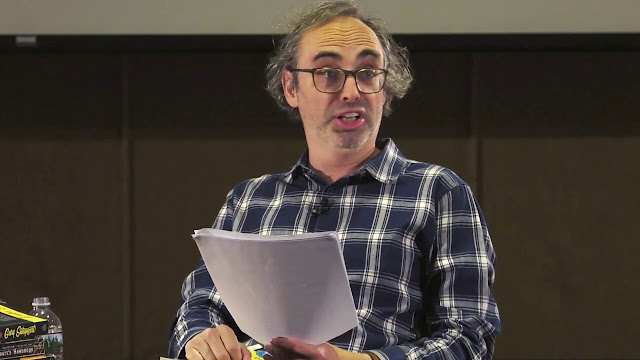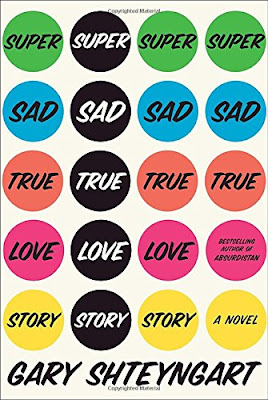It’s
taken me three readings of Gary Shteyngart’s Super
Sad True Love Story
to recognize finally my vague discomfort accepting the presumption
of sadness at this exceptional novel’s ironic ending. That’s one
reading every three years starting with 2013, three years after its
publication. The trienniality is coincidental—unless, as suggested
by Shteyngart’s Tweeted tribute quote on the death last week of his
beloved Random House editor Susan Kamil,
"He did believe, dimly, in a democracy of ghosts. The souls of
the dead, perhaps formed committees, and these, in continuous
session, attended to the destinies of the quick."
It’s
from Nabokov’s
novel Pnin.
Shteyngart added, “I would like to believe this is true. Farewell
Susan.”
Accepting
it as true, why not take it a step further and believe one of these
dead souls’ “committees” has been goading me to fathom the
elusive mix of emotions I experience at Super
Sad’s
ending? Not that it would matter particularly to anyone else. And
yet, there is a confluence of sorts that might well be calling to
certain of the
quick
to, in a social media vernacular, “Get off your asses, and be quick
about it!”
I
feel this urgency. It’s the reason I’ve started reading William
Vollmann’s massive two-volume report on the virtual demise of our
species. In the first third of Carbon
Ideologies,
which is as far as I’ve gotten, Vollmann’s focus is on the
nuclear generating disaster at Fukushima,
Japan in 2011 (a year after Super
Sad
was published). He’s written it as an explanation to possible
survivors of what he sees as inevitable climate catastrophe. His
writing is framed as an apology to future inhabitants of Earth, and,
less directly by presuming its inescapability, scaring the living
crap out of those of us who still entertain an implausible hope of
somehow averting the disaster. “I knew I’d find no adequate
personal answer to the question ‘What should we do?’” he tells
these theoretical survivors, “But
I felt ashamed of doing nothing.
Well, in the end I did nothing just the same, and the same went for
most everyone I knew. This book may help you in the hot dark future
to understand why.”
 |
| Gary Shteyngart |
I feel the urgency also
because of the political imbroglio we’ve permitted that exacerbates
the disparities in our society, and because of the growing passivity
of a culture easily distracted and manipulated by cheap
entertainment, with its expectations of titillation, comfort, and the
illusion of freedom.
This
awareness was less defined when I first read Super
Sad True Love Story,
which I was enticed to read by a review Maureen Corrigan broadcast on
NPR. What got my attention, perked my interest, induced me to buy the
book was Corrigan’s description of a fictional near future that
struck me as already incipient in its drift toward a junction of
chaos and control. It rang of Orwell and Huxley, 1984
and Brave
New World,
but with comic twists and an endearing familiarity. As then New York
Times critic Michiko Kakutani put it, “Mr. Shteyngart has
extrapolated every toxic development already at large in America to
farcical extremes.”
Reading
it the first time I focused on the distance between then and
Shteyngart’s fictional future. And, of course, there was no
avoiding the love
story between 39-year-old second-generation Russian Jewish immigrant
Lenny Abramov and 24-year-old second-generation Korean immigrant
Eunice Parks. This story, told by way of diary entries and social
media conversations, provides the narrative train through Super
Sad’s
dystopian landscape, yet I found my interest veering more toward a
skeptical voyeurism than empathizing with the obviously mismatched
couple. Whether the concept of true love is realized between Lenny
and Eunice, who could say with any certainty? Kakutani clearly
thought so, as did several other reviewers who discussed the book at
the time. I see the two as using one another, each for different
reasons. But maybe that
is love.
Maybe it’s only love’s illusions I recall
(thanks, Joni). I waxed enthusiastic with the brief piece I posted
here in 2013 after the first read, but not about the romance.
“At
least one of Super
Sad's
predictions, that books will become dangerously unfashionable, has
already almost come to pass,” I wrote then, adding, “It's one of
the funniest, gloomiest social satires I have encountered.”
Three
years later, after my second read, I still didn’t try to review the
book,
intimidated probably by the enthusiastic gushings of Kakutani,
Corrigan and others, including Terrence Rafferty in Slate.
Looking back, I find I like Rafferty’s best of the three reviews.
He gives more plot and details. I should condense plot and details
down for you myself but after reading the professionals
I’m stymied, as if doing so would be akin to fashioning a Fabergé
egg out of paper-mâché.
Instead I’ll give you a link to Rafferty’s review:
here.
So,
there you have it, something you can hold against me forever,
depending on how much “forever” we have left to live. A book I’ve
read three times over the past six years, and still
haven’t gotten up the gumption to do it justice. And yet, still, on
the verge of hysteria, I implore you to read the damned book BEFORE
IT’S TOO LATE!!
Back now to William Vollmann’s
horrifying apology to whomever might still be alive after the planet
that’s hosted us all these eons finally turns out the lights…
Wait! I just went back and re-read
the ending, the last chapter, one more time. I see now the cause of
some of the ambivalence I’ve been feeling about it: I wasn’t
ready for so abrupt a change in tempo. The main narrative had me
rushing, frantically, to the apocalyptic edge, the unendurable
sensation of imminent void. The last chapter, "27 – Welcome Back,
Pa’dner,” begins with a sense of free-fall, a little relevant
backstory, just enuf to offer the racing mind a more contemplative
speed. It works, I suspect, for most readers. Not for me. My
cognition is sluggish, slower to shift. My inner brakes were
screaming as I tried to decipher how the words I was reading fit with my despairing terror of the calamitous denouement I'd been approaching. Then the
cinematic break taking me from Kansas sepia to the Technicolor of
Oz. Stumbling with contradictions, my ambivalent feet carried me to a
place where at last I could sit and sort things out. And where I
could appreciate the language, the secret humor, the tranquility and
the beauty of simply being alive, no matter what future lay beyond
the next heartbeat. Reading this chapter a fourth time, without the
preceding headlong dash, I finally appreciated what Shteyngart had
done. And despite the title and the scrambled emotions throughout, I
believe he and I, on this point, are of one mind.
If so, this might help explain
my inability to fully embrace the sadness others have found in Super
Sad True Love Story. I see it as a sadness compromised
by foolish expectations. A vanity. A sadness we deserve.
My advice: Find out for
yourself.
[Find
more Friday's Forgotten Books links at Todd
Mason's amazingly eclectic blog]

I think you have convinced me I have to read this book, Mathew, or at least one of the fiction books by this author.
ReplyDeleteIt's the only one I've read by him, Tracy. But it really grabbed hold of me.
Delete